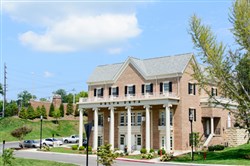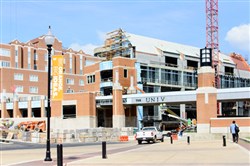VOL. 38 | NO. 34 | Friday, August 22, 2014
UT students return to transforming campus
By Sam Stockard

The new Delta Zeta house is one of many in the University of Tennessee’s new Sorority Village, which is open for the fall semester. It’s one of many campus construction projects.
-- Chase Malone | The LedgerColleges and universities, no matter how venerable and historic, were designed to move forward, to be progressive.
New academic disciplines are developed, buildings are replaced and tuition goes up. Coaches come and go.
It happens to a lesser or greater extent each autumn, but this fall, the University of Tennessee at Knoxville is in a “transition phase,’’ says Kelsey Keny, president of the Student Government Association.
“It’s interesting to be at UT at a time when so many new things are happening,” Keny says, referencing the several construction projects underway, as well as the hiring of a new men’s basketball coach … sports always being a topic of discussion on the Knoxville campus.
“Even though many of us won’t get to experience some of the new facilities, there’s something really cool about being able to say, ‘I was there when they built that new academic building,’ or ‘I was one of the last classes to see that athletic facility.’”
Sororities houses at last
Here are some of the construction projects that are helping change the face of the UT campus.

UT’s new Student Union is one of many projects, both under way and wrapping up, as school begins.
-- Chase Malone | The LedgerSorority Village: The first sorority houses in UT history are to be completed and opened this fall. Two were finished in the last few weeks, and female students are to move in during early August.
When they’re done, 13 of UT’s 17 sororities will have houses in the campus complex. They’re being paid for through private donations and mortgage agreements paid for by residential rent and chapter fees.
Fred D. Brown Residence Hall, the first new one in 45 years, housing more than 700 men and women.
A new Student Union, which is to open in 2015, remains under construction, but the pedestrian bridge to The Hill, the university landmark and the oldest part of the campus, will be open this fall, making it easier for students to get around. The bridge connects Volunteer Boulevard to The Hill, and the east side will open onto a plaza between the Burchfield and Austin Peay buildings.
The Student Union will offer a larger auditorium/performance venue, along with more program, conference and meeting space, a larger ballroom for large events and banquets, an expanded book and technology store and extra dining options.
“UT doesn’t stand still, and it’s great to be a part of that,” Keny says.
“With the new school year starting soon, I can’t wait for all of us students to be back on campus, continuing to be part of the progress and seeing what’s to come.”
What it costs in 2014
Classes began Aug. 20 for UT-Knoxville, which has a typical enrollment of about 27,000. University officials are expecting a large freshmen class and more transfers than normal.
New in-state undergraduates will pay $5,938 in tuition and fees per semester, while those admitted before fall 2013 will pay $5,138 and those admitted from fall 2013 to summer 2014 will pay $5,792 for a 12-hour course load.
Out-of-state undergraduates will pay from $14,363 to $15,025.
In-state graduate students will pay $5,801, out-of-state grad students will pay $15,025. Tuition and fees for law students admitted from fall 2013 to fall 2014 is $9,524, $125 more than for those admitted earlier.
Out-of-state tuition and fees for law students is $18,876.
Service Learning , Smart Cities
New academic programs at UT-K this year include a pilot project on “S” designation courses, those with a service-learning component, and a Smart Cities initiative in which 10 courses will involve working with the nearby Cleveland.
Last spring, nine faculty members representing different colleges at UT participated in the service project.
The next step is adding an “S” to course numbers to allow student to spot them easily in the course catalog.
“Service-learning aids in critical thinking, complex problem solving, appreciation for diversity, connection of theory to practice, ability to work on a team, and a more nuanced understanding of course content,” says Kelly Ellenburg, campus service-learning coordinator.
The university hopes students will be attracted to the courses by the “S” and enjoy “transformative learning experiences” while taking them, according to Ellenburg.
In addition, employers will be able to identify those courses and understand the skills and competencies students gained while taking them.
The catalog is expected to reflect the “S” designation by 2016-17 or 2017-18, according to the university.
Under the Smart Cities initiative, city staff and experts in economic development, arts and social sciences are working with UT professors to develop projects for service-learning and internship-based courses that could involve anything from education and health care to city planning and long-range transportation projects.
The idea is to encourage people to think about addressing “complex problems, which are inherently interdisciplinary, on a local level.”